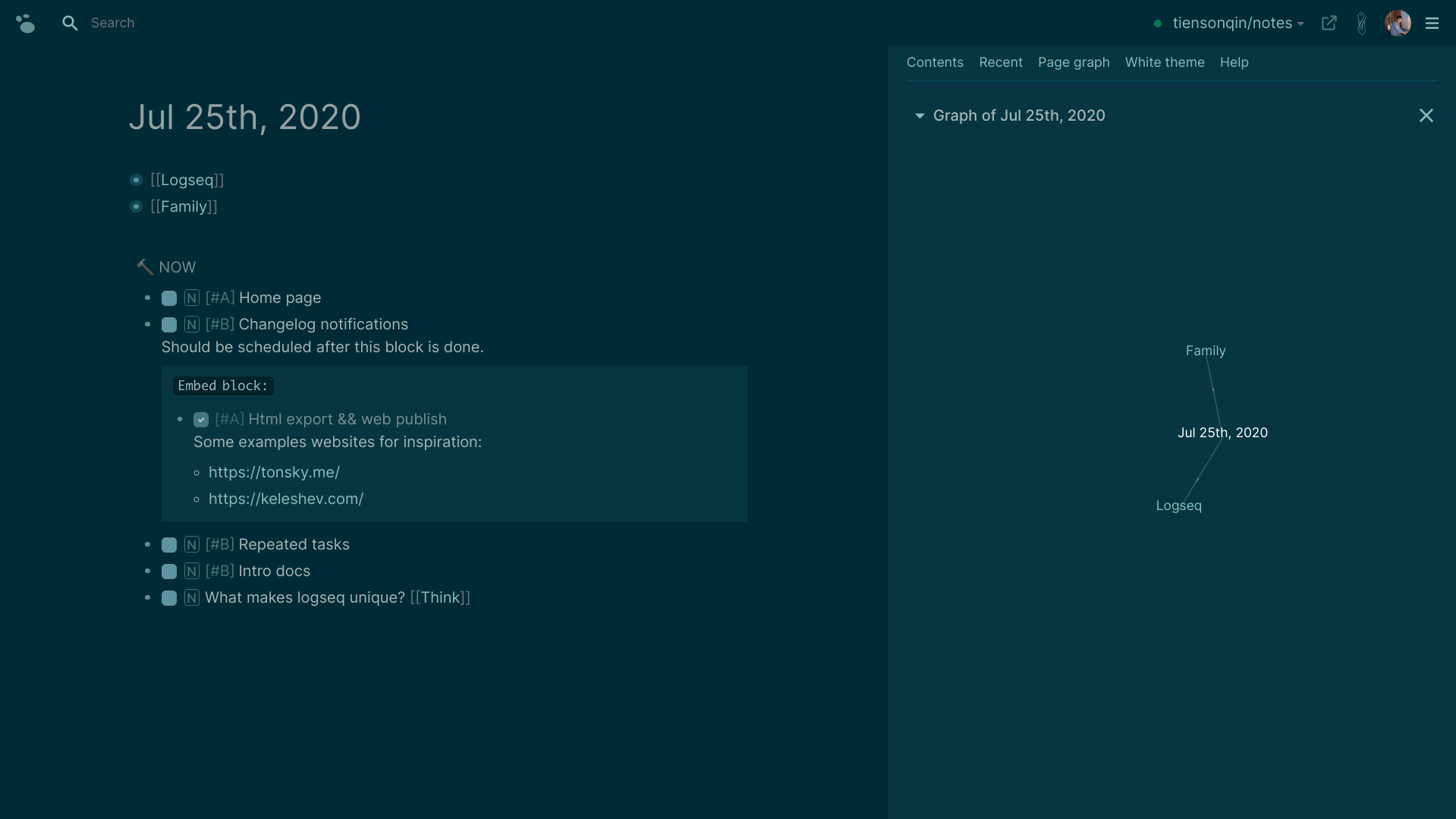A local-first, non-linear, outliner notebook for organizing and sharing your personal knowledge base.
Use it to organize your todo list, to write your journals, or to record your unique life.
Logseq is a platform for knowledge sharing and management. It focuses on privacy, longevity, and user control. Notice: the backend code will not be open-sourced for security reasons and other potential risks.
The server will never store or analyze your private notes. Your data are plain text files and we currently support both Markdown and Emacs Org mode (more to be added soon).
In the unlikely event that the website is down or cannot be maintained, your data is, and will always be yours.
Please go to https://discuss.logseq.com/c/feature-requests/7.
-
Make sure you have registered a GitHub account and already created a repository (could be an old one). Currently we only support GitHub, but more sync options (e.g. Gitlab, Dropbox, Google Drive, WebDAV, etc.) will be added soon.
-
Visit our website https://logseq.com/.
-
Click the "Login with GitHub" button in the upper-right corner.
-
Following the on-screen instructions, install Logseq app on your selected repository.
-
Start writing and have fun!
Logseq is hugely inspired by Roam Research, Org Mode, Tiddlywiki, Workflowy and Cuekeeper, hats off to all of them!
Logseq is also made possible by the following projects:
- Clojure & ClojureScript - A dynamic, functional, general-purpose programming language
- DataScript - Immutable database and Datalog query-engine for Clojure, ClojureScript and JS
- OCaml & Angstrom, for the document parser
- isomorphic-git - A pure JavaScript implementation of Git for node and browsers
- sci - Small Clojure Interpreter
- Our blog: https://logseq.com/blog - Please be sure to visit our About page for the latest updates of the app
- Twitter: https://twitter.com/logseq
- Discord: https://discord.gg/KpN4eHY - Where we answer questions, disucss workflows and share tips
- Github: https://github.com/logseq/logseq - everyone is encouraged to report issues!
The following is for developers and designers who want to build and run Logseq locally and contribute to this project.
- Node.js & Yarn
- Java & Clojure. (If you run into
Execution error (FileNotFoundException) at java.io.FileInputStream/open0 (FileInputStream.java:-2). -M:cljs (No such file or directory), it means you have a wrong Clojure version installed. Please uninstall it and follow the instructions linked.)
git clone https://github.com/logseq/logseq
yarn
yarn watchOpen http://localhost:3001.
yarn releaseRun ClojureScript tests
yarn
yarn cljs:test
node static/tests.jsRun Clojure tests. (Note: .cljc files may be tested both by ClojureScript, and Clojure.)
clj -Mtest-cljyarn watchyarn dev-electron-appyarn release-electrongit clone https://github.com/logseq/logseqcd logseq
docker build -t logseq-docker .docker run -v $(pwd):/home/logseq/logseq -p 3001:3001 -p 9630:9630 -p 8701:8701 --rm -it logseq-docker /bin/bashcd logseq
yarn
yarn watch




